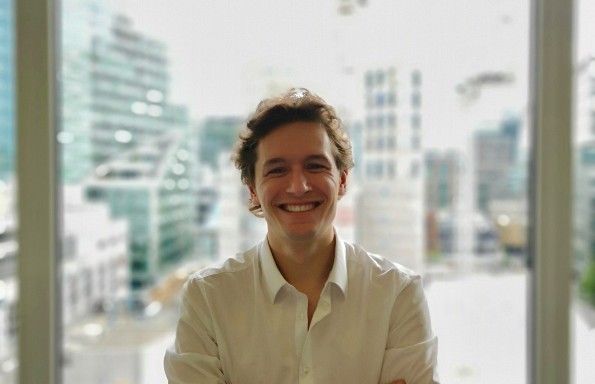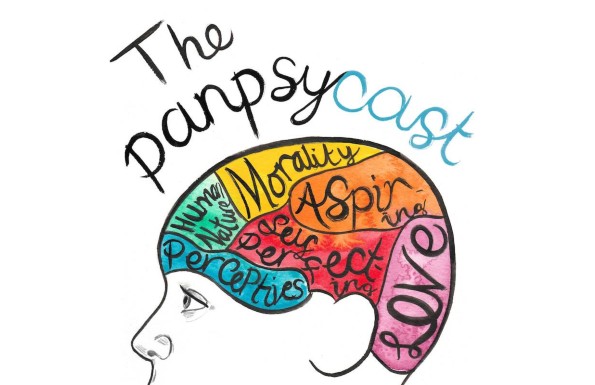In Conversation with Craig Blackhall: Jack Symes and The Panpsycast

Craig: For my sins, I sat down with returning student Jack Symes last week to discuss his PhD research, and the importance of public-facing philosophy. Jack is best known for his work on The Panpsycast, a weekly philosophy podcast for students, teachers, and the wider public. The show has over 70,000 subscribers making it one of the most popular higher education podcasts worldwide (iTunes, Spotify, TuneIn, Google Play).
Welcome back to Liverpool, Jack! It’s bloody lovely to see you. Can you tell me about your current area of research, and what you find interesting about it?
Jack: Thank you, Craig. I’d love to. My research question is as follows: why should we consider belief in a good-god significantly more reasonable than belief in an evil-god? This is what the kids are calling ‘the evil-god challenge’, the focus of my PhD.
When I ask which is more reasonable (good-god or evil-god), I’m being quite sneaky. Belief in an evil-god is generally considered to be an absurd belief, but, when we parody the arguments for a good-god in favour of an evil-god, it turns out that they’re just as reasonable! So, if we think that belief in an evil-god is absurd, we should think that belief in a good-god is equally as absurd!
This is what the boomers call a reductio ad absurdum - an objection that attempts to reduce an argument into absurdity. I love reductios; they’re silly, they’re fun, they’re absurd! But, as well as being fun, they can also be powerful arguments. To quote Daniel Dennett, reductios are ‘the crowbar of rational inquiry, the great lever that enforces consistency!’
If readers are interested, I was interviewed on the Society for Philosophers in America radio show Philosophy Bakes Bread a couple of years ago where I spoke about the premise of my thesis. It should still be available as a podcast.
In a word, my research focuses on an evil-god and how an evil-god might undermine the widely accepted belief in a good-god. Does that make sense?
C: No, but that’s fine… was postgraduate study and working in academia always planned, or something you decided upon during your studies?
J: I was never interested in anything at school. My high school days were spent trying to make people laugh and, inevitably, getting into trouble for it. I discovered philosophy at the age of sixteen and did everything I could to ensure that I could study and teach the subject for a living. The life goal was the PhD. I can die now.
C: Please don’t die, we love you. Is there anything about studying for a PhD that has surprised you?
J: That’s a really good question... before I started the PhD, I taught philosophy and religion at King Edward VI High School for Girls. Every day I looked forward to seeing my students and colleagues. I’m a very social person, I love working with other people (and apparently, I love sounding like a LinkedIn Profile). I thought that the PhD would be isolating, that I wouldn’t get to work with interesting people, but it’s been the opposite. I’ve been collaborating on some exciting projects and working with some incredible people across the University.
C: So, how did The Panpsycast begin?
J: The Panpsycast was born back in 2016, I was at the University of Birmingham at the time doing a postgrad in teaching studies. The idea was to create something that people would want to listen to, something that could inspire people to study philosophy for its own sake. It had to be entertaining, as well as informative. So, I pitched the idea to my then friend and mentor (and now co-host), Andrew Horton, who presented the idea to Olly Marley (co-host) - we did the ‘research’ and we sat down to record our first episode.
The podcast has evolved considerably over the past four years. For better and for worse (mainly worse), two years into the project Gregory Miller joined us… what’s nice is that the podcast doesn’t just allow us to document our conversations with the big thinkers, disseminating their research to students and the wider public, but the development of our own philosophies as well.
I should note that the podcast wouldn’t be possible without the support of Culham St Gabriel’s and Westhill Endowment, as well as our incredibly generous patrons.
If you want to hear more about the origin and thinking behind the podcast, I did a lengthy interview with the American Philosophical Association back in 2018. It’s freely available online.

C: Do you feel that the use of different mediums, such as podcasting, is the best way to teach and engage people with philosophy?
J: I think that, on the whole, podcasts are the best way to present and engage with philosophy.
C: Why?
J: I have so many reasons… I could switch my PhD thesis to this topic. I’ll riff here and give one or two.
Philosophy is a dialogue, a great conversation that we have with ourselves, or with each other. A podcast (if done right) fits the nature of the subject like a glove. Unlike a lecture or a book, a conversation is engaging; it can embody multiple points of view - theses, criticisms, suggestions, questions. You can have multiple speakers representing different schools of thought, playing different roles, but also, these speakers can play the role of Socrates (or even, the role of the listener): Could you explain that further? I didn’t quite understand that point? Is this what she’s saying? I mean you have to do it right. It’s helpful that Greg, Olly and Andy are some of the best teachers in the business.
Think back to Plato’s dialogues; imagine them bursting off the page into your ears. Now, even better: imagine if the speakers focused on making the most interesting ideas and thinkers from the past accessible… imagine if they entered into dialogues with the biggest thinkers of their time.
I hear the podcast jeerers! ‘Philosophy is a rigorous discipline, one that requires precision, detail, premises, and extortionate tuition fees!’
Firstly, if you research, plan, and record a conversation properly, I think you can convey these features. We spend weeks preparing for episodes, researching the ideas and discussing how we should present them, and the recording and editing processes are intense - we don’t just turn up. The outcome, I hope, is that we do justice to the nature of the subject. Secondly, let’s not forget that philosophy doesn’t always need to be nerdy. There are trillions of people who are interested in exploring philosophical ideas whose idea of purgatory consists of truth trees and modal logic. Here’s Dennett again, ‘there’s a time and a place for rigorous arguments, with all the premises numbered and the inference rules named, but these don’t need to be paraded in public.’
Here’s another reason. Education should be freely available to everybody, regardless of their age, country, or background. It shouldn’t matter whether or not you have the qualifications, whether or not you can afford the tuition fees … whether or not you’re born in a liberal society. Our message is simple: if you have an internet connection, a pair of headphones, and a borderline offensive sense of humour, we’re there for you.
C: What are your proudest moments working on The Panpsycast?
There are literally hundreds of moments from the project that mean the world to me. I think back to some of the interviews we’ve done - Daniel Dennett, Rebecca Goldstein, Galen Strawson; some of the biggest thinkers of our time - all of the laughs and interesting conversations I’ve had with Greg, Andy, and Olly - there are too many stories and moments to pick from…
I’m very proud of the podcast’s popularity. It shows that there is an appetite for the type of philosophy we’re doing. What really hits home is that many of our listeners choose to support the show through monthly donations and write in with notes of thanks. This means a lot, because every project has its peaks and valleys. I’ll share a recent message that really moved me. This might be a nice place to end.
‘I'd like to thank all of you at the Panpsycast for putting out so many structured, informative, and funny episodes regarding philosophy. I am an accountant from Chicago and have been interested in philosophy in my spare time. Recently I was quite depressed and was looking for an escape, and I discovered your podcast… you presented actual lessons so I could make progress in philosophy, instead of being merely entertained. I have now decided to enter into a philosophy degree and work 4 days a week. My major will be ethics. Thanks for making a change in my life.’
I’ll leave it there…
Thank you for taking the time to speak with me and ask such intrusive questions, Craig. Seriously, thank you.
C: Thank you, Jack. This was eye opening. You’ve been a great inspiration to me, I wish you were my son.
J: What?
C: Nothing…